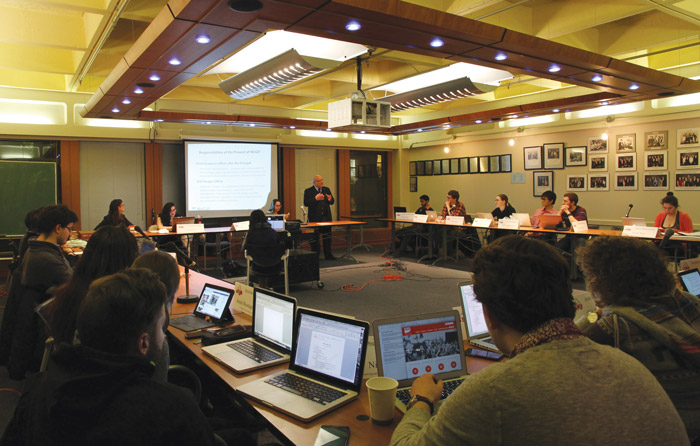School of Environment student campaigns for a seat on SSMU Council
The Students’ Society of McGill University (SSMU) Legislative Council met last Thursday to discuss the possibility for the School of Environment to gain a seat on Council, McGill’s stance on tuition deregulation, and the possibility of joining FEUQ.
Benjamin Ger, a member of the McGill Environment Student Society (MESS), spoke to Council regarding the addition of a School of Environment seat in SSMU Council.
Ger’s proposal was based on the grounds that Environment students do not have a large enough voice on campus, despite their faculty size of over 500 people.
“There are just no spots dedicated to us [on campus],” Ger said. “I wanted to change that.”
Medical councillor Joshua Chin pointed out that there are four Arts, three Science, and one Arts & Science representatives to Council. He argued that as the School of Environment currently has students in all three of these faculties, they already have a certain amount of representation through these councillors. According to Chin, adding another seat for the School of Environment runs the risk of over-representation.
Ger presented possible solutions to counter over-representation such as taking away environment students’ representation in the faculties of Arts & Science, Arts, and Science. Instead, he suggested, they would only be able to vote for an Environment representative.
Ger added that the current division of the School of Environment’s constituency has led to a weakening of their collective voice.
“It’s very hard to get a [voiced] decision for us,” Ger said. “We are smaller than [the science and arts undergraduate societies] but we are over 500 students large.”
The last faculty to gain a seat in Council was Arts & Science in 2011, a faculty comprised of around 600 students. According to Arts & Science Senator Chloe Rourke, the addition was positive for the students of the Faculty of Arts & Science, who felt prior to this addition they were not properly represented.
“It’s a valuable person to have, just because it gives Arts & Science [students] a […] direct link and a more [direct] representation,” she said. Arts representative Lola Baraldi also spoke in favour of creating the additional Council seat.
“I think it would be very valuable from a sustainability point of view, especially since we don’t have as many sustainability coordinators as last year,” she said.
If Ger can collect the requisite 500 signatures, the decision to create a new Council seat for the School of Environment will be made by students this Winter Referendum period.
Provost discusses tuition
deregulation
Provost Anthony Masi spoke regarding the issue of the deregulation of all remaining non-deregulated faculties for international students. Deregulated faculties currently include that of Management, Science, Engineering, and Law.
Building upon discussion on deregulation at the Jan. 21 Senate meeting, Masi said deregulation would allow McGill to retain more money from students tuition fees, particularly because money from the international student tuition supplement fee is currently collected by the provincial government and re-distributed across Quebec universities.
In response to a question as to how McGill would use the funds gained from deregulating tuition, Masi stated that although McGill has not worked out the exactly where the money is needed most, academics remain a top priority for the McGill administration.
FEUQ Presentation
Jonathan Bouchard, president of the Fédération Étudiante Universitaire du Québec (FEUQ), a Quebec student union, spoke on behalf of the organization at the Council meeting.
According to Bouchard, FEUQ lobbies the federal and provincial government for student rights.
“McGill has a university point of view, where we try to have a more complete Quebec and student point of view,” he said.
FEUQ currently works with the Post-Graduate Students’ Society (PGSS) Council to help lobby for equitable prices for student housing, off-campus work programs, and against tuition hikes. Another project includes pushing for legislation that renders unpaid internships illegal. Bouchard disagreed with Masi’s stance on deregulation, warning Council of the possible repercussions of the fee increase, which may lead to determental tuition hikes.
“French students are [experiencing] a tripling of their fees […] so we’re doing as much as we can [to pressure] the government,” he said. “The benefits that [are] gained from international students will surely decrease.”
Although SSMU was a founding member of FEUQ in 1989, it disaffiliated in 2006 and is not currently a voting-member. Current afflilation with FEUQ would result in approximatly a $2.50 fee per student.
“What exactly can we get more with FEUQ than with we had with TACEQ?” Councillor Anikke Rioux asked referring to the Table de concertation étudiante du Québec (TACEQ), a student union that SSMU had been a part of, but disaffiliated from in 2014.
In response, Bouchard spoke to FEUQ’s national status.
“The advantage with FEUQ is […] the capacity for its members to have a complete impact on […] the national assembly [… and] on what is said on the national level.”
Council did not decide on their affiliation with FEUQ at Monday’s meeting.
New General Manager
Jennifer Varkonyi, SSMU’s new General Manager, attended her first Legislatitive Council on Thursday. Her first offical day was Monday, Feb. 3.








